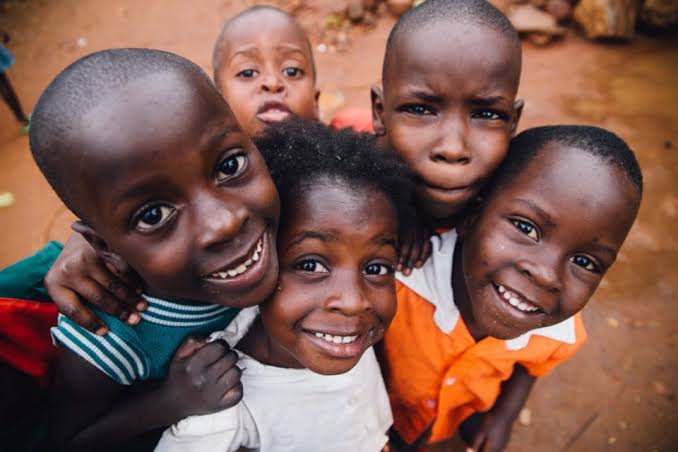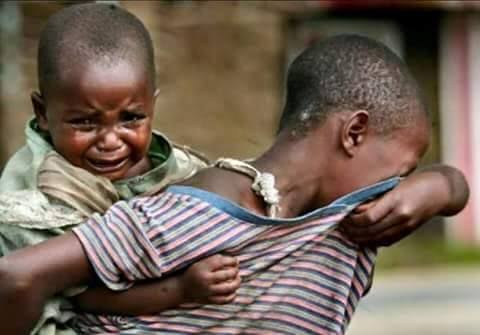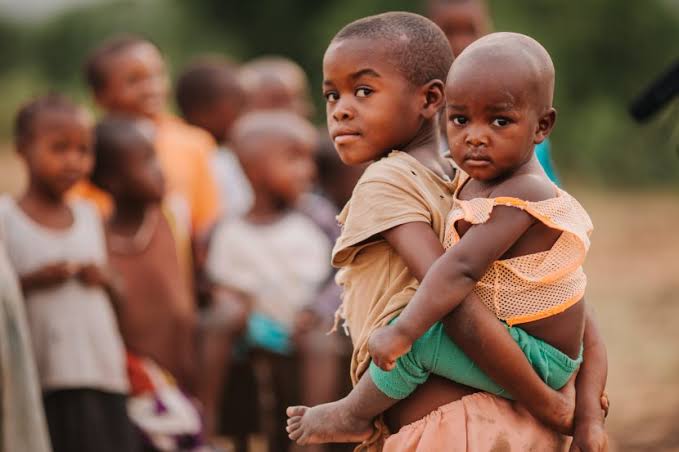Orphan: The gate of Joy into Jannah
‘The Prophet (saw) said, “The one who cares for an orphan and myself will be together in Paradise like this,“and he (saw) held his two fingers together to illustrate’. [Bukhari]
By Abdussalam Abdulfattah
One of the most prominent characters of our beloved prophet was showing how much he loved and cared about the children around him. He would show so much affection to them like allowing them to play on his back while he was leading the prayer, and displaying his affection to his grandson publicly for his other companions to emulate. A generation which consisted of the Prophet and his companions showing mercy towards the children built a strong foundation in rising the best generation of righteous Muslims like no other. A child who spent 10 years with the prophet confessed; I served the Prophet for ten years, and he never said to me, “Uf” (a minor harsh word denoting impatience) and never blamed me by saying, “Why did you do so or why didn’t you do so?” Sahih al-Bukhari 6038.

In a narration, the prophet told his companion, “Last night two people came to me and made me get up, and they said to me: ‘Let’s go.’ So I set off with them and we came to a verdant garden, in which all were the colours of spring, where there was a man who was so tall that I could hardly see his head in the sky. Around the man was the largest number of children I had ever seen…”Then among things that the two angels explained to him was: “As for the tall man who was in the garden, that was Ibraheem. As for the children who were around him, these are all the children who died in a state of fitrah.” One of the Muslims said: “O Messenger of Allaah, what about the children of the mushrikeen?” He said: “And the children of the mushrikeen.” [Narrated by al-Bukhaari, 7047].
“If I were to become your father and Ayesha your mother, would that make you feel better?”’ The pearl-like words passed the lips of the blessed tongue of the Holy Prophet out of sympathy for an orphan child standing alone with tearful eyes, wearing old clothes. The beautiful reply delighted him indeed. In fact, he had a wonderful beginning of his life on that very especial day. This orphan child was Bashir Bin Ghuzayya, a blessed companion whose father was martyred in the battle of Uhud. He was a young boy at that time and was to live a traumatic life of Orphan hood. But ‘mercy for all the worlds’, the Holy Prophet took this crying child in his arms, stroked his head and showed great kindness to him. Thereafter, he no longer felt alone and isolated; instead, he got the most beautiful family of the world and felt pride in his matchless fortune.
The above-mentioned different stories on the love, mercy and compassion of the Holy Prophet towards children or living orphans can be seen and felt. Prior to the Islamic era, lineage meant everything and status came from belonging to a tribe and in a situation, where everybody was nicknamed ‘the son of so and so’, orphans – who had no lineage – were viewed as the lowest of the low. Then orphans were often victims of cruelty and ignored members of society who had no rights nor did they have caring people around them. The only thing they would mostly face from an early age was a miserable life. In the Quran, Allah (SWT) complained about the Quraysh treatment of orphans: “No! But you do not honour the orphan…” Al Fajrvs17. By rebuking the Quraysh for dishonouring orphans, Allah (SWT) is simultaneously telling us that orphans must be honoured and respected. Not only are they entitled to receiving support; they also deserve to have dignity, just like all people do. Therefore, do not put pressure on the orphan.’ Surah Al-Duha, Ayah 9). The Holy Prophet was also an orphan as he lost his father before his birth, then lost mother and grandfather at a very early age. He himself experienced the sufferings faced by an orphan.

Today, things are not much different in the society. It is even worse. In modern times characters like Oliver Twist, symbolizes how much orphans suffer. Through him, we know that in 19th century Victorian England, orphans were sent to abusive and unsanitary workhouses and orphanages. According to UNICEF, it is estimated that 153 million children worldwide (6.5% of the world population) are orphans with approximately 5,700 children becoming orphaned daily.
The Arabic word for orphan is Yateem. Any child (male or female) who has no father or whose father has died and the child has not reached the age of puberty is classified as a Yateem. Islamic Jurisprudence further clarifying that the death of the mother will not render a human child an Orphan but rather munqatiʿ (broken). This is because the father is often considered as the primary sustaining caregiver. The Qur’an definition of an orphan differs from the common English usage of the term as defined in the Oxford dictionary: ‘a child whose parents are dead’. The word ‘Yateem’ has been mentioned about 22 times in the glorious Quran, highlighting the significance of the most marginalised segment of society. However, there is recognition of the fact, that in today’s world, the term ‘orphan’ refers to the children who lose their parents before reaching the age of 18.
There is no doubt that orphans are supported by all the religions; governmental and nongovernmental organisations that even do not believe in any religion. But Islam is the only religion that has extensively talked about orphans in the glorious Quran and the Hadith. Heavenly divine instruct us in most religions to help these children whom Death has taken away their provider, the sponsoring hand, so to replace it by many hands offering mercy, love, and care. The words of the Bible call people to actively pursue meeting the needs of children who have been orphaned, because these waiting children are essential to Him. Deuteronomy 10:18 says, “He executes justice for the fatherless and the widow, and loves the sojourner, giving him food and clothing.” Psalm 68:5 tells us, “Loving Father of the fatherless and protector of widows is God in his holy habitation.” James 1:27 says, “Religion that is pure and undefiled before God, is this: to visit orphans and widows in their affliction, and to keep oneself unstained from the world.”

Islam, the civilizing force, came to teach man that Allah created him from a pair of male and female. Both sexes are of equal importance and elevated the status of orphans. Islam uplifted the deprived classes and brought them respect, honour and glory. Ill-treatment towards orphans is one of the worst kinds of oppression that is totally prohibited in Islam as Allah Almighty says in the glorious Quran: “Have you seen the one who denies the Recompense [the religion]? For that is the one who drives away the orphan’. Al Ma’un: 1-2”.
In choosing an orphan as His Messenger, Allah (SWT) raised the status of orphans everywhere. The Quran revolutionized their treatment, and made caring for orphans a compulsory part of the religion. ‘They ask you, [O Muhammad], what they should spend [in charity]. Say, “Whatever you spend of good is [to be] for parents and relatives and orphans and the needy and the traveller. And whatever you do of good – indeed, Allah is Knowing of it.”’ Al Baqarah: 215.
Furthermore, this is complemented with a relevant warning against oppressing orphans: “So do not be harsh with the orphan.” This warning is repeated in another early chapter, al-Maʿūn: “[Prophet], have you considered the person who denies the Judgement? It is he who pushes aside the orphan.” Later verses from the same period also cover similar themes: 89:17 rebukes those who do not honor the orphan, whilst 90:14-5 and 76:8-9 encourage the good treatment and selfless feeding of orphans. This early Makkah narrative served to unite the early struggling Muslims upon mutual assistance and strongly challenged the commonplace violation of orphan’s rights perpetrated openly in the pre-Islamic Arabian era of ignorance (jāhiliyyah). These spirited Qur’anic presentations would leave no doubt in the minds of the addressees that orphans were anything but honourable.
The Qur’an acknowledges that orphan hood is a common occurrence that cannot be eradicated, and thus instead moves to recognize the social issues affecting orphans and provides various clear rulings and exhortations that will ensure that orphans are cared for and not exploited. The Qur’an provides comprehensive guidance in relation to the treatment of orphans. In one verse, Allah (SWT) suggests that a person who ignores orphans is not really a believer. In another, Allah (swt) describes the righteous in Paradise as being those who took care of orphans during their worldly life. ‘And they [the righteous] give food in spite of love for it to the needy, the orphan, and the captive…’ Al Insan: 8.”And [recall] when We took the covenant from the Children of Israel, [enjoining upon them], “Do not worship except Allah; and to parents do good and to relatives, orphans, and the needy. Q2:83

We can see from the contextual analysis of this topic that, valuable path to paradise is being toyed with by many of us. This is something we should raise acute awareness of from the pulpits and in public forums, encouraging each other to do more for our hereafter and walk with ease into paradise. Allah (SWT) and Prophet Muhammad (saw) repeat this promise of Jannahacross the Quran and Sunnah, which make us realise the importance of taking care of orphans and children.
Prophet Muhammad (saw) taught us that all human beings are completely equal in status ‘except in piety and good deeds’. Our status in the eyes of Allah is dependent upon our righteous actions – and one of the ways we can achieve righteousness is by giving to orphans: When mentioning certain good deeds in the Qur’an, Allah also describes in detail the beautiful things in Jannah we will earn by doing these good deeds. In Surah Insan, Allah describes people who give their food to orphans and the needy, purely for His sake: ’And they give food, in spite of love for it, to the needy, the orphan, and the captive. [Saying], “We feed you only for the countenance of Allah. We don’t want from you either reward or gratitude. Indeed, we fear from our Lord a Day austere and distressful”’.
In a narration, the prophet of Allah says, ‘’whosoever passes his hand over the head of an orphan to please Allah Almighty gets a virtue in return for every hair that his hand passes over. Moreover, whosoever does good to an orphan boy or girl, I and he will be like this in Paradise’ (he said this after having joined his two fingers). (Musnad Imam Ahmad, vol. 8, pp. 272, Hadith22215). In another beautiful prophetic report: “The best house among the Muslims is one where an orphan is well treated, and the worst house among the Muslim is one where an orphan is badly treated.” The Prophet said, “Whoever takes in an orphan among the Muslims to raise, to feed him and give him drink, Allah admits him into Paradise without a doubt, unless he has done a sin for which he is not forgiven.” (Jami’ at-Tirmidhi). Also “The person who strives on behalf of the widows and the needy is like those who strive in the way of Allah and like those who fast in the day and pray at night.” (Al-Adab al-Mufrad).
Islam has laid great emphasis on uplifting the lives of orphans. It considers taking care of an orphan as worship. Their care and fostering is an established sunnah of the Prophet and his companions. There are many benefits and rewards associated with this act. [4:10] (As for) those who swallow the property of the orphans unjustly, surely they only swallow fire into their bellies and they shall enter burning fire.
The Quran mentioned the orphans in 23 different verses showing its ongoing concern for them and by sponsoring a needy orphan; one can protect them from the devastating effects of hunger and malnutrition. One could potentially be saving their lives and when one do that one will be called through the gate of Joy into Jannah and enjoy the (literally) heavenly luxuries. In addition, it is a Sadaqah Jariyah which contains incredible barakah; on top of all this, it saves lives! Allah (SWT) describes the righteous in Paradise as being those who took care of orphans during their worldly life.

Islam accorded orphans a venerable position now we must ponder over what role we should play in helping and serving these souls living around us. It is also equally important to educate our societies about the noble act of caring and protecting the orphans. The Prophet would often play and joke with orphans, as well as feed them from his own food. The Prophet said, “I and the guardian of an orphan will be in the Garden like these two,” and he held up two fingers close to each other. (Al-Adab al-Mufrad) . The reward of Jihad, Night prayer and Fasting
The Messenger of Allah (saw) said, ‘The best house among the Muslims is the house in which orphans are well-treated. The worst house among the Muslims is the house in which orphans are ill-treated’. [Bukhari]
We pray we can bring so much joy to children – especially orphans – that we are someday called through the gate of Joy into Jannah and earn the food of Jannah. Truly , they are the gate of Joy into Jannah and the rewards are immeasurable..





SubhanAllah 🌸, such a beautiful reminder about the honor and blessings of caring for orphans in Islam. Truly, the words of the Prophet ﷺ, “I and the guardian of an orphan will be in Paradise like this,” should inspire us all to show mercy, kindness, and love to these children. They are indeed a gate of joy into Jannah.
At the same time, we should also nourish our own hearts with the Qur’an, as it constantly reminds us of our duties toward the weak and oppressed. Reciting and reflecting on Surah Yaseen is one of the ways to strengthen our faith and soften our hearts toward acts of mercy. If you’d like to read or recite Surah Yaseen online, you can visit my site here: Surah Yaseen
. May Allah make us people of compassion and grant us the company of the Prophet ﷺ in Jannah
We appreciate your comment . May Allah be our Helper . Aamin
This article is truly insightful and deeply moving. It beautifully highlights Prophet Muhammad’s (saw) love, compassion, and care for orphans, supported with references from the Qur’an and Hadith that emphasize their elevated status and rights. The article goes beyond Islamic teachings by also addressing modern societal issues faced by orphans, supported with data from UNICEF, giving it universal relevance and depth. Its narrative style emotionally engages readers while providing practical guidance and spiritual rewards, motivating action. Overall, it is a perfect blend of knowledge, compassion, and actionable inspiration, educating the mind and touching the heart.